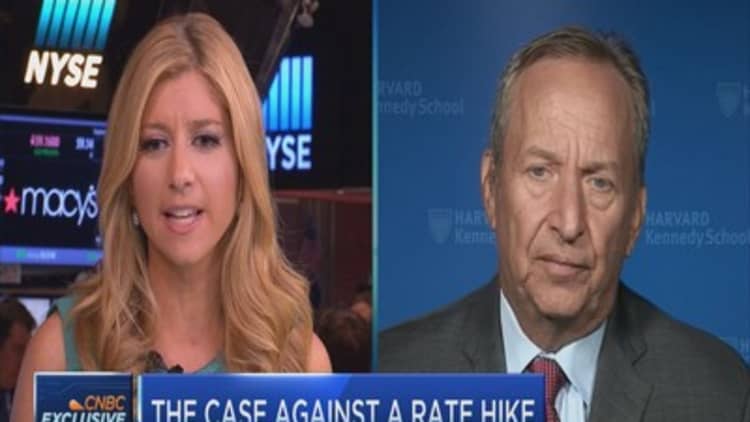
Data on the three areas the Federal Reserve cares about most—inflation, employment and financial stability—are all indicating the central bank should hold off on raising interest rates, former Treasury Secretary Larry Summers said Thursday.
At present, inflation is below target, the labor force participation rate is lower than it's been in a quarter of a century, and financial market volatility is elevated, he said.
"Today, when you've got real major uncertainties coming out of China, coming out of the other emerging markets; when it hasn't been such an easy period in Japan; when worldwide you look at major countries, real interest rates are zero and everywhere inflation is expected to be below 2 percent, it's very hard to see the case," he told CNBC's "Squawk Box."
Read More GE's Jeff Immelt: China growth fears are overdone
The Fed cannot guarantee that it will hike interest rates gradually, as it is expected to do, if it is truly data dependent, Summers said.
"They can indicate a desire to be slow," he said. "When people see them move when inflation is well below target, when market volatility is high, I think people are going to be very uncertain as to what comes next.
"That doesn't seem like a prudent risk to take."
The Fed should move when and if inflation looks like it's threatening to break through its 2 percent target, he said.
Read More David Tepper: Good time to take money off the table
The crucial point, Summers said, is that the Fed can reverse course in seven weeks if it regrets its decision not to raise rates. However, it has a "real problem" if it hikes and it turns out to be a mistake.
"Then they've got drama in financial markets that they didn't want. They've got the possibility of a deflationary psychology taking hold. They've got the need to reverse themselves on a dime, which isn't easy to do and would do much more damage to their credibility," he said.


